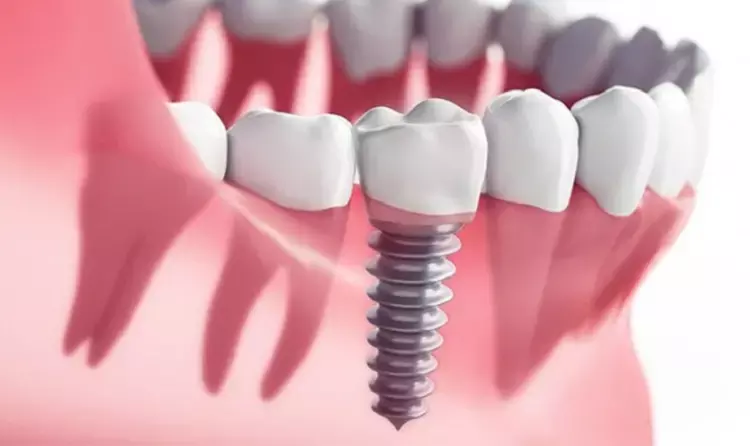- Home
- Medical news & Guidelines
- Anesthesiology
- Cardiology and CTVS
- Critical Care
- Dentistry
- Dermatology
- Diabetes and Endocrinology
- ENT
- Gastroenterology
- Medicine
- Nephrology
- Neurology
- Obstretics-Gynaecology
- Oncology
- Ophthalmology
- Orthopaedics
- Pediatrics-Neonatology
- Psychiatry
- Pulmonology
- Radiology
- Surgery
- Urology
- Laboratory Medicine
- Diet
- Nursing
- Paramedical
- Physiotherapy
- Health news
- Fact Check
- Bone Health Fact Check
- Brain Health Fact Check
- Cancer Related Fact Check
- Child Care Fact Check
- Dental and oral health fact check
- Diabetes and metabolic health fact check
- Diet and Nutrition Fact Check
- Eye and ENT Care Fact Check
- Fitness fact check
- Gut health fact check
- Heart health fact check
- Kidney health fact check
- Medical education fact check
- Men's health fact check
- Respiratory fact check
- Skin and hair care fact check
- Vaccine and Immunization fact check
- Women's health fact check
- AYUSH
- State News
- Andaman and Nicobar Islands
- Andhra Pradesh
- Arunachal Pradesh
- Assam
- Bihar
- Chandigarh
- Chattisgarh
- Dadra and Nagar Haveli
- Daman and Diu
- Delhi
- Goa
- Gujarat
- Haryana
- Himachal Pradesh
- Jammu & Kashmir
- Jharkhand
- Karnataka
- Kerala
- Ladakh
- Lakshadweep
- Madhya Pradesh
- Maharashtra
- Manipur
- Meghalaya
- Mizoram
- Nagaland
- Odisha
- Puducherry
- Punjab
- Rajasthan
- Sikkim
- Tamil Nadu
- Telangana
- Tripura
- Uttar Pradesh
- Uttrakhand
- West Bengal
- Medical Education
- Industry
Adjunctive antibiotics improved marginal bone level stability post dental implants: Study

A recent study found the efficacy of adjunctive systemic antibiotics in the treatment of peri-implantitis, a condition which poses a significant challenge in dental implantology. The major findings of this study were published in the newest edition of Journal of Clinical Periodontology. This study was conducted by the team led by Caroline Riben Grundström analyzed the clinical, radiographic and microbiological outcomes following surgical intervention, with or without the use of antibiotics.
The study recruited 84 patients overall with peri-implantitis which encompassed a total of 113 implants. The patients were randomly assigned to three groups, where one group received amoxicillin and metronidazole, another received phenoxymethylpenicillin and metronidazole and the third group received a placebo. The treatment protocol involved resective surgery and implant surface decontamination with adjunctive antibiotics or placebo.
Over the course of up to 12 months, the study meticulously evaluated various parameters including probing pocket depth (PPD) reduction, marginal bone level (MBL) stability, bleeding on probing (BOP), suppuration on probing (SOP), mucosal recession (REC), clinical attachment level (CAL), bacterial levels and adverse events.
The findings of the study unveiled notable improvements across all groups in terms of clinical and radiological parameters. But, statistically significant differences were observed between these groups regarding MBL stability and treatment success rates. Antibiotic groups demonstrated superior outcomes when compared to the placebo group with increased MBL stability and greater treatment success rates.
The bacterial levels of specific pathogens associated with peri-implantitis, namely Aggregatibacter actinomycetemcomitans and Tannerella forsythia, expressed a marked reduction in the antibiotic groups by further highlighting the efficacy of adjunctive antibiotic therapy in controlling microbial colonization. Also, the study identified antibiotic use as a potential prognostic indicator for treatment success that emphasized the pivotal role of antibiotics in achieving favorable treatment outcomes.
Amidst the promising results, the outcomes illuminated the importance of carefully weighing the benefits against the risks associated with antibiotic therapy. Gastrointestinal disorders were observed as the most reported adverse events in the antibiotic groups that emphasized the need for meticulous consideration of potential side effects and the looming threat of antibiotic resistance. This study offers valuable inputs into the role of adjunctive systemic antibiotics in improving clinical outcomes and further research regarding these findings could pave the way for enhanced therapeutic approaches to manage this prevalent dental condition.
Source:
Riben Grundström, C., Lund, B., Kämpe, J., Belibasakis, G. N., & Hultin, M. (2024). Systemic antibiotics in the surgical treatment of peri‐implantitis: A randomized placebo‐controlled trial. In Journal of Clinical Periodontology. Wiley. https://doi.org/10.1111/jcpe.13994
Neuroscience Masters graduate
Jacinthlyn Sylvia, a Neuroscience Master's graduate from Chennai has worked extensively in deciphering the neurobiology of cognition and motor control in aging. She also has spread-out exposure to Neurosurgery from her Bachelor’s. She is currently involved in active Neuro-Oncology research. She is an upcoming neuroscientist with a fiery passion for writing. Her news cover at Medical Dialogues feature recent discoveries and updates from the healthcare and biomedical research fields. She can be reached at editorial@medicaldialogues.in
Dr Kamal Kant Kohli-MBBS, DTCD- a chest specialist with more than 30 years of practice and a flair for writing clinical articles, Dr Kamal Kant Kohli joined Medical Dialogues as a Chief Editor of Medical News. Besides writing articles, as an editor, he proofreads and verifies all the medical content published on Medical Dialogues including those coming from journals, studies,medical conferences,guidelines etc. Email: drkohli@medicaldialogues.in. Contact no. 011-43720751


